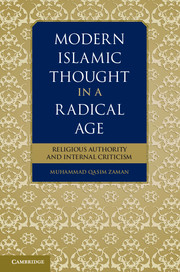Book contents
- Frontmatter
- Contents
- Acknowledgments
- A Note on Transliteration, Spelling, and Other Conventions
- Map
- 1 Introduction
- Part One
- Part Two
- 5 Bridging Traditions: Madrasas and their Internal Critics
- 6 Women, Law, and Society
- 7 Socioeconomic Justice
- 8 Denouncing Violence: The Ambiguities of a Discourse
- 9 Epilogue: The Paradoxes of Internal Criticism
- Bibliography
- Index
- References
8 - Denouncing Violence: The Ambiguities of a Discourse
Published online by Cambridge University Press: 05 November 2012
- Frontmatter
- Contents
- Acknowledgments
- A Note on Transliteration, Spelling, and Other Conventions
- Map
- 1 Introduction
- Part One
- Part Two
- 5 Bridging Traditions: Madrasas and their Internal Critics
- 6 Women, Law, and Society
- 7 Socioeconomic Justice
- 8 Denouncing Violence: The Ambiguities of a Discourse
- 9 Epilogue: The Paradoxes of Internal Criticism
- Bibliography
- Index
- References
Summary
Although violence in Pakistan in the years following the terrorist attacks of September 11, 2001, has become synonymous with al-Qa`ida and especially the Taliban, I begin not with them but rather with Yusuf al-Qaradawi, the author of the most extensive Muslim discussion produced in the aftermath of 9/11 to grapple with issues of war, violence, and terrorism. One of the main concerns of this chapter is to examine the substance, rhetoric, and ambiguities of Qaradawi's book, the nearly 1,400-page-long Jurisprudence of Jihad. As he sees it, misunderstandings about jihad are most pervasive among militant and other Islamists, and they are the primary audience of his book. But there are plenty of other misunderstandings, or misrepresentations, of jihad to go around in other circles, and there are many, besides the Islamists, who are said to need this work. Among these, Qaradawi lists the traditionally educated Muslim jurists, lawyers trained in the modern legal traditions, historians, “Orientalists,” those concerned with interfaith and inter-civilization dialogue, politicians, military men, and, not least, the general reading public. Though the sheer range of his presumed audience underscores the pervasiveness of misconceptions about jihad, Qaradawi does not make any serious attempt to consistently address all components of this readership. I, too, will not try to examine what he expects each section of this imagined audience to take away from his book. I am interested, rather, in his stance as a self-conscious critic of certain kinds of violence; the tensions and elisions his internal criticism points to; and the claims to religious authority that are at stake in the desire to both reaffirm and to redraw particular boundaries, to both defend and rethink Islam.
My second concern in this chapter is with Deobandi discourses on jihad and terrorism, before and especially after the events of 9/11 and in both Pakistan and India. There has not been much direct or documented exchange of ideas between Qaradawi and the South Asian `ulama on these questions, but they have all dealt with shared issues. Among the most important of these in recent years is the question of suicide bombing. I examine the discussion of this question – in Qaradawi's work and in South Asia – at some length both to illustrate the ambiguities of the `ulama's positions on it and as a crucially important site of their contemporary engagement with the medieval tradition.
- Type
- Chapter
- Information
- Modern Islamic Thought in a Radical AgeReligious Authority and Internal Criticism, pp. 261 - 308Publisher: Cambridge University PressPrint publication year: 2012



